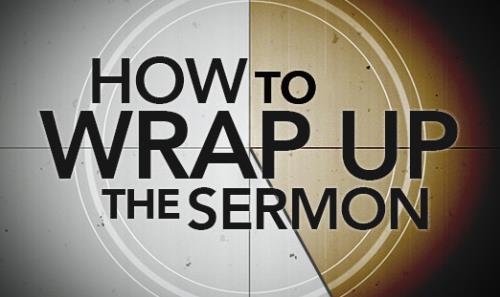The Importance of Conclusions
Conclusions Are More Important Than You Think
Quite awhile ago in this blog I looked at introductions in several posts, saying that introductions are more important than you think. Here’s a link to the first of the posts in that series. Lately, as I’ve been working through a class on preaching for CLI, I’ve turned my attention to conclusions. Therefore, this post begins a series on the importance of conclusions to your sermon.
The Purpose of Conclusions
It is easy to neglect the importance of conclusions when you preach. You work hard studying the passage or the topic that you are going to preach on. Then you develop a structure for your message that helps people follow along. You choose an introduction the invites people to follow your journey. Once all of that is done, you should begin to think about how to conclude your message, or how to bring it to a satisfying end, appropriate to your message. Remember, we are thinking of the importance of conclusions as the final say to your people. There are three primary purposes for your conclusion:
- The emphasize once again the theme statement of your message. In our discussion of preparing to preach, we looked at the importance of summing up the big idea in your message in one sentence. The conclusion is your opportunity to emphasize that point again.
- A second purpose of your conclusion is to give a final appeal, exhortation or encouragement related to your message.
- And finally, the conclusion is to bring your message to a wrap up, or satisfying end.
Missing the Importance of Conclusions
Not surprisingly, there are many wrong ways to conclude your message. We’ll begin the discussion in this post on wrong ways to conclude, and will pick it up again in the next. So, what are some of the wrong ways to conclude a sermon?
Don’t Plan It
I’ve done this. After I’ve spent a great deal of time preparing through prayer and study, and then identifying the big idea, and then coming up with an engaging introduction, it’s easy to forget the importance of conclusions as you come to the end. You just want to get the message done. I used to have a prayer group that would meet with me prior to the services in the morning, and more than once I would say to them, “I have no idea of how I’m going to end. Please pray for the Spirit to take over at that time.”
Sometimes, the Spirit would come with some powerful word. More often, what would happen is that I would preach the first service, and end with something that gave me a better idea of what I could do next time. In the second service the conclusion would improve. And by the third service, I would have what I considered to be an excellent conclusion. At times, the Spirit would say to me, “You should have done the work you just did earlier in the week.”
When you consider the importance of conclusions you will work hard at ending well.
The Brake Conclusion

A bad conclusion
A second bad way to conclude is to come to a screeching halt. Imagine the passenger in this car. She is not expecting the shock of the brakes going on. Shock and fear are the result.
When your audience is journeying with you, it can be similarly shocking when you don’t wrap things up, but rather, slam on the brakes. The listener is then feeling like the message was never really concluded–it just stopped.
Sometimes this kind of conclusion is called the “I’m out of time” conclusion. The speaker says, “I’m out of time, so let’s conclude with prayer.” Sometimes it is true that there is a time crunch. Other times, I suspect that this is an excuse for a speaker who didn’t understand the importance of conclusions in his or her message.
If you want to reflect on this more fully before the next post, here’s a youtube video that reflects on the importance of conclusions too sermons.




Leave a Reply
Want to join the discussion?Feel free to contribute!